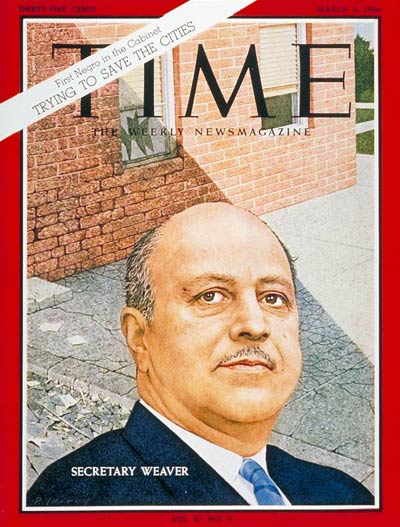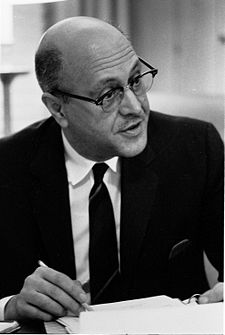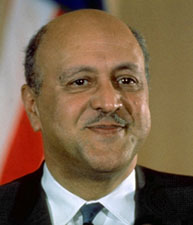
Robert Clifton Weaver, Ph. D - Harvard University
_____________________________________________________________
In 1966
, the Department of Housing and Urban Development
was created, and President Lyndon B. Johnson
chose Weaver to become the first secretary of the new department. In addition, Weaver also became the first black person to ever hold a cabinet post. Mr. Weaver was also a proud member of Omega Psi Phi Fraternity, Inc
President Kennedy had done everything short of promising the new position to Weaver while trying to create HUD in 1961. In normal legislation, Republicans and southern Democrats vehemently opposed the new department, and the following year, President Kennedy made another attempt by unsuccessfully using his reorganization authority to create it. As a result, Congress disallowed presidents from ever again using that authority to create a new department (it had been previously used to create the Department of Health, Education, and Welfare during the Eisenhower Administration).
When the department's creation was finally approved in 1965, there was still a sense that Weaver would be the most desired nominee. In public, President Johnson had reiterated Weaver's status as a potential nominee but would not promise him the position. In private, Johnson had strong reservations. He often held pro-and-con discussions with ROy Wilkins, Executive Director of the NAACP.
President Johnson got into some heavy strategizing about other potential nominees, none of which were black. He wanted a top administrator but also someone who would bring excitement to the job. In discussions, he often said that a white nominee "could do more for the Negro than the Negro could do for himself." Johnson was also worried about how the new Secretary would interact with the Democratic South. His ideal qualifications came from people like Richard Daley and Laurence Rockefeller (although the former was most likely not seriously considered as a nominee). At one point, Johnson had thought of putting in Ben Heineman or Berl Bernhard as Undersecretary and letting Weaver phase out over a year or two.
The report said that Weaver had accomplished the most strenuous and nearly-impossible tasks, that he created a genuine sense of team spirit, and that he was both more exciting and intellectual than he seemed. Johnson’s own take of the report showed him that Weaver had to live with the political disadvantages of being a liberal progressive African American for the past 25 years, which meant that to advance and succeed, he always had to be respectful, decent, put on a good appearance, and not be arrogant. Johnson misjudged these qualities as failing to be exciting. Ten days after receiving the report, Weaver was successfully confirmed by the Senate.

Both leaders felt that Weaver had problems bringing positive attention to himself, and Johnson also noted that he was susceptible to political mistakes. One week before the Department of HUD was being voted on, Weaver performed what Johnson referred to as "the biggest bonehead anyone ever pulled." While Administrator of HHFA
, he passed a regulation that benefited the middle class, when the intent of HUD was to benefit the poor (over three-quarters of which were African American. To make matters more problematic, Weaver indicated to Joe Califano
that if he wasn't accepted for the position, he would resign, which in a public relations context would have made him a martyr
against the administration. Johnson had privately indicated that if Weaver weren't nominated, he may have promoted or transferred him elsewhere.
Source: http://en.wikipedia.org/wiki/Robert_C._Weaver
See our list of featured Omega Men